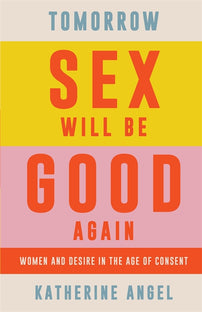Sex and Self-Knowledge: Beyond Consent
Good sex shouldn't depend on faultless self-knowledge. Katherine Angel puts forward the case for desire's emergent and contextual nature.

In recent years, two requirements for good sex have emerged: consent, and self-knowledge. Consent, in Joseph Fischel’s words, gives ‘moral magic to sex.’ Self-knowledge too, is paramount. ‘Know what you want and learn what your partner wants’, urged a New York Times article in July 2018; ‘good sex happens where those two agendas meet.’ ‘Have the conversation’, a sex educator exhorted on BBC Radio 4’s ‘The New Age of Consent’ in September 2018—the direct, honest conversation about sex, about whether you want it, and exactly what you want. Have it before you are in the bedroom; have it in the bar, have it in the cab home—any awkwardness will be worth it later. This rhetoric is not entirely new; Rachel Bussell Kramer wrote in 2008 that ‘as women, it’s our duty to ourselves and our partners to get more vocal about asking for what we want in bed, as well as sharing what we don’t. Neither partner can afford to be passive and just wait to see how far the other person will go.’ Women are urged to know their desires, and be clear and confident about expressing them. Simple, right?
These principles are framed as common-sense, and easy enough. They are also framed as inherently liberatory, since they emphasise women’s capacity for—and right to—sexual desire and pleasure. But in urging women to be confident and clear about their sexual desires, the consent discourse risks denying the fact that women are often punished for precisely the sexually confident and assertive positions they are being asked to cultivate. What’s more, the exhortations to confidence and positivity—the insistence on defiant affirmation—have an underbelly: they render lack of confidence, insecurity, or not-knowing as ugly, abject, and shameful. They brook little vulnerability or ambivalence. And they make inadmissible the experience of not knowing what one wants in the first place.
* * *
It’s often been acknowledged that fear of male violence can make it difficult for women to say no to sex; a hurt and entitled male ego is one more likely to lash out. One target of Weinstein’s campaign of sexual intimidation spoke in an interview of having been afraid to ‘poke the bear’; afraid, when confronted with his demands, to do anything to inflame his anger, violence, or desire for retribution. A witness in his ongoing trial has told the court that if Weinstein ‘heard the word “no”, it was like a trigger for him’.
Equally important, however, is the difficulty of saying yes, and of expressing desire. Evidence that a woman has used apps such as Tinder to meet sexual partners can work against her in a courtroom, even if this is irrelevant to the allegation before the court. Helena Kennedy has shown in Eve Was Shamed that a woman’s willingness to have casual sex with a stranger often counts heavily against her in a trial. If the case in court, Kennedy writes, resulted from ‘a contact made through a hook-up website, there would be little hope of conviction.’ You can’t be raped, in other words, by someone you met on Tinder; by someone you are thought to have met out of a confident desire for sex.
Women know, then, that their sexual desire can remove protection from them, and can be invoked as proof—not that violence did not take place, but that violence wasn’t wrong (she wanted it). A woman’s sexual appetite can be invoked to justify male aggression, and it is often the very means through which violence is exonerated. Why else would a lawyer hold up a rape complainant’s underwear in court? In a trial in Ireland in which a seventeen-year-old alleged a twenty-seven-year-old man had committed rape, a female counsel did precisely this, saying ‘You have to look at the way she was dressed. She was wearing a lace thong.’ Once a woman is thought to have said yes to something, she can't say no to anything. Her desire disqualifies her from justice.
Where do these ugly facts leave women, the very same women who are told, in relentlessly upbeat tones, to know and express their desires; that they owe it to themselves, to their sexual happiness, to their sexual partners, and to their safety, to proclaim their desire without shame? What good is all this expression of positivity and confidence? As Sara Ahmed observes, sometimes ‘the repetition of good sentiment feels oppressive’.
It’s no coincidence that the reformulation of consent as affirmative and enthusiastic took root in the 1990s, a decade in which post-feminism made sexual assertiveness and sex-positivity imperative. In the era of post-feminism, the utterly reasonable claim that women should be afforded sexual freedom— that it should be acceptable for them to declare their desire loudly, to be perverse and lustful and up-for-it—slid into the more dubious insistence that women areand mustbe so. And something of this insistence—that in the name of sexual equality, women must hold their end up and be assertive, declamatory, unashamed—found its way into the affirmative and enthusiastic consent initiatives.
Emphasising women’s desire is often thought to be inherently liberatory: if we establish once and for all that women are lustful creatures, then shame and stigma will wane—and if we normalise the expression of desire in women, it will be harder for men to coerce them, or to claim confusion about whether a woman ‘wanted it’ or not.
But this logic does not, in fact, get us very far. Who does the exhortation to know one’s desires and express them really serve? In a recent interview, Donna Rotunno, the female lawyer defending Harvey Weinstein in trial, said that ‘women need to be very clear about their intentions’ and ‘prepared for the circumstances they put themselves in.’ She also said that men ‘in today’s world’ should ask women to sign consent forms before sex. Here, knowing one’s desires serves as a condition for protecting oneself from violence; in the consent conversation, too, knowledge of one’s desires too becomes something with which we must come, as if armed, to sex, in order to be clear and avoid confusion. We must know our own desires, as a condition of pleasure and of safety. That seems like a steep bargain to me.
Knowing one’s desires, in Rotunno’s logic, also functions as a form of protection for men anxious about later allegations. These equivocations, and Rotunno’s use of them, should at the very least signal to us how limited the injunctions to know and to express our desires really are as the overwhelming rubric for ensuring good—pleasurable, ethical—sex. With friends like these, who needs Weinsteins?
We must be wary of urging particular (namely, assertive, direct) modes of sexuality on women as the pre-emptive solution to male sexual violence. This is a strategy that places the burden of sexual communication, and of sexual violence, disproportionately on women, making them—their feelings, and their words—responsible for good sex. And if women fail in these requirements, who bears the burden of that failure?
* * *
When did we buy the idea that we know what we want, whether in sex or elsewhere? This idea assumes that desire is something that lies in wait, fully formed within us, ready for us to extract. But a sexual ethics that is worth its name has to allow for obscurity, for opacity, and for not-knowing. Sex is social, emergent, and responsive; it is a dynamic, a conversation. Our desires emerge in interaction; we don’t always know what we want; sometimes we discover things we didn’t know we wanted; sometimes we discover what we want, or don’t, only in the doing.
This feature of desire—its uncertain, unfolding quality—is frightening. It’s frightening because it opens up the possibility of women not knowing their own desire, and of men capitalising on that lack of certainty by coercing or bullying them. But we must not deny this aspect of desire as a consequence; we must not insist on a sexual desire that is fixed and known in advance, in order to be safe. That would be to hold sexuality hostage to violence.
We don’t always know what we want, and we are not always able to express our desires clearly. This is in part due to the violence, misogyny, and shame that desire’s discovery is difficult, and its expression fraught. But desire’s emergent nature—its responsiveness to context, to our histories, and to the desires and behaviours of others—is also what can make sex exciting, rich, and meaningful. We are social creatures; our desires emerge—and have always emerged, from day one—in relation to those who care, or do not care, for us. How then, do we make this fact galvanising rather than paralysing? How do we resist retreating into an insistence either that desire is something it is not (transparent, fixed, certain), or that sexuality is too complex for any sustained ethical enquiry? How do we have good sex without insisting that we must first know all of our desire? This is the task before us; instead of fiddling with notions of consent on which we place too high an ethical burden, we need to articulate an ethics of sex that does not try frantically to keep desire’s uncertainty at bay. We need, in contrast, to start from this very premise—this risky, complex premise: that we shouldn’t have to know ourselves in order to be safe from violence.
- This essay is part of a series of pieces that we are running this Valentine's week, looking at love, desire and relationships at the intersection of capitalism, the state, and politics. See them all here.
- Katherine Angel is the author of Tomorrow Sex Will Be Good Again: Women and Desire in the Age of Consent.
[book-strip index="1" style="buy"]Katherine Angel's critically-acclaimed analysis of female desire, consent, and sexuality.
